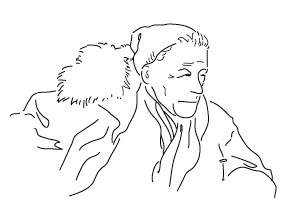Paul-Émile Victor facts for kids
Quick facts for kids
Paul-Émile Victor
|
|
|---|---|
 |
|
| Born |
Paul Eugène Victor
28 June 1907 |
| Died | 7 March 1995 (aged 87) |
| Nationality | French |
| Education | École Centrale de Lyon |
| Occupation | ethnologist and explorer |
| Spouse(s) | Éliane Victor |
| Children | Jean-Christophe Victor |
Paul-Émile Victor (born Paul Eugène Victor; June 28, 1907 – March 7, 1995) was a famous French explorer and scientist. He spent much of his life studying and exploring the cold, icy regions of the world, especially the Arctic and Antarctic. He was known for leading many French expeditions to these polar areas.
Contents
Paul-Émile Victor: Explorer of the Poles
Paul-Émile Victor was a brave explorer and an ethnologist. An ethnologist is a scientist who studies different cultures and groups of people. Victor was especially interested in the people and environments of the polar regions.
Early Life and First Adventures
Paul-Émile Victor was born in Geneva, Switzerland. His family was French. He studied at a special engineering school in Lyon, France, and finished in 1928. In 1931, he learned how to fly an airplane. His instructor and friend, Claude de Cambronne, taught him.
Exploring Greenland
In 1936, Victor led an exciting trip across Greenland. He and his team used dog-sleds to travel. The team included Robert Gessain, Michel Perez, and Eigil Knuth. They traveled 825 kilometers (about 513 miles) from west to east. This amazing journey took them 44 days to complete.
After World War II
During World War II, Paul-Émile Victor helped the United States Air Forces. After the war, he started a group called the "Expéditions polaires françaises." This group organized French expeditions to the North and South Poles. He dedicated his life to exploring these cold, distant places.
Discoveries and Recognition
In 1951, Victor led a survey in Greenland. His team found that Greenland is actually made up of three large islands. These islands are hidden under a huge sheet of ice. For his important work, he received a special award in 1952. The Royal Geographical Society in London gave him the Patron's Medal.
Lasting Legacy
Paul-Émile Victor's work left a lasting mark on the world. A mountain in Antarctica is named after him. It is called Mount Victor and is located in the Belgica Mountains.
Victor retired in 1977. He moved to Bora Bora, a beautiful island in French Polynesia. He passed away there in 1995. His son, Jean-Christophe Victor, also became well-known. He hosted a weekly TV show about world geography until 2016.
See also
 In Spanish: Paul-Émile Victor para niños
In Spanish: Paul-Émile Victor para niños
 | Bayard Rustin |
 | Jeannette Carter |
 | Jeremiah A. Brown |

